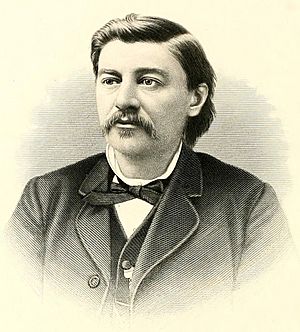Charles N. Brumm facts for kids
Quick facts for kids
Charles Napoleon Brumm
|
|
|---|---|

From 1881's History of Schuylkill County, Pa.
|
|
| Member of the U.S. House of Representatives from Pennsylvania's 12th district |
|
| In office November 6, 1906 – January 4, 1909 |
|
| Preceded by | George R. Patterson |
| Succeeded by | Alfred B. Garner |
| Member of the U.S. House of Representatives from Pennsylvania's 13th district |
|
| In office March 4, 1895 – March 3, 1899 |
|
| Preceded by | James B. Reilly |
| Succeeded by | James W. Ryan |
| In office March 4, 1881 – March 3, 1889 |
|
| Preceded by | John W. Ryon |
| Succeeded by | James B. Reilly |
| Personal details | |
| Born | June 9, 1838 Pottsville, Pennsylvania |
| Died | January 11, 1917 (aged 78) |
| Political party | Greenback (1881-1885) Republican |
Charles Napoleon Brumm (born June 9, 1838 – died January 11, 1917) was an important American politician. He served in the U.S. House of Representatives for Pennsylvania. This is where laws are made for the whole country. He belonged to both the Greenback Party and the Republican Party.
Contents
Growing Up and School
Charles N. Brumm was born in a town called Pottsville, Pennsylvania. He went to local schools, which were called "common schools" back then. Later, he attended Pennsylvania College in Gettysburg, Pennsylvania. After college, he spent two years studying law.
Serving in the Civil War
When the American Civil War began, President Abraham Lincoln asked for volunteers. Charles Brumm joined the army as a private. He was quickly chosen to be a first lieutenant in Company I, Fifth Regiment, Pennsylvania Volunteer Infantry.
In 1861, he joined the army again for three more years. He became a first lieutenant in Company K, Seventy-sixth Regiment, Pennsylvania Volunteer Infantry. He worked on the staff of General Barton and later General Galusha Pennypacker. He helped with supplies and was an aide-de-camp, which means he was a personal assistant to the general. He served until his time in the army ended in 1871.
Life After the War and Becoming a Politician
After the Civil War, Brumm went back to studying law. In 1871, he became a lawyer. He tried to get elected to the U.S. House of Representatives in 1878 but didn't win that time.
First Time in Congress
Brumm was elected to Congress as a member of the Greenback Party. He served in the 47th and 48th Congresses. Then, he was elected as a Republican for the 49th and 50th Congresses. He tried to get reelected in 1888 but was not successful. In 1884, he was a delegate at the 1884 Republican National Convention, which is a big meeting where the Republican Party chooses its presidential candidate.
Later Years in Congress
Charles Brumm was elected to Congress again as a Republican. He served in the 54th and 55th Congresses. During these years, he was the chairman of the United States House Committee on Claims. This committee handles requests for money from people who believe the government owes them something. He tried to be nominated again in 1898 but didn't succeed.
He was elected to Congress one more time for the 59th Congress. He filled a spot that became open after another politician, George R. Patterson, passed away. He was reelected to the 60th Congress. He served until 1909, when he decided to leave Congress. He had been elected as a judge for the Schuylkill County Court of Common Pleas. During his time in the 60th Congress, he was also the chairman of the United States House Committee on Mileage.
He worked as a judge until he passed away in Minersville, Pennsylvania.
Cool Inventions
Charles Brumm was known for being very good with machines and inventing things. He received official letters patent for a meat cutter he invented. A patent means he had the legal right to his invention. He also invented other useful things like:
- A brick and mortar elevator (to lift building materials)
- A railroad snow shovel (to clear snow from train tracks)
- A self-starting car-brake (a brake that would automatically start working)
Charles Brumm's son, George Franklin Brumm, also became a Congressman.

